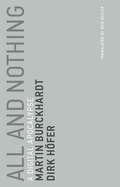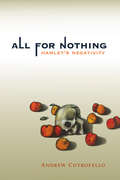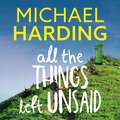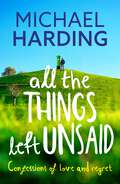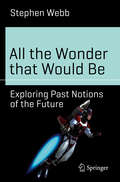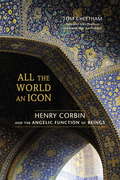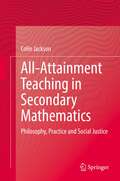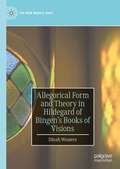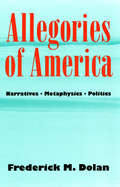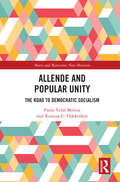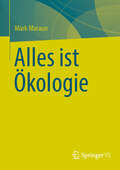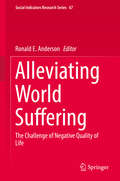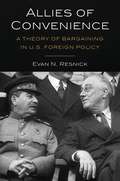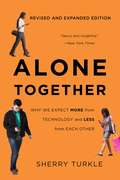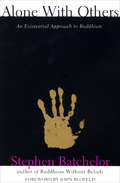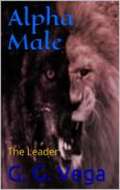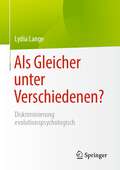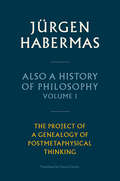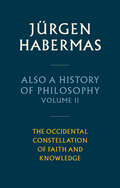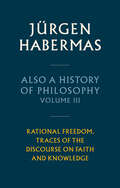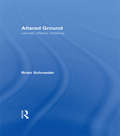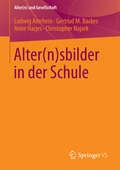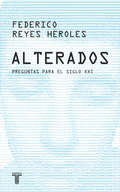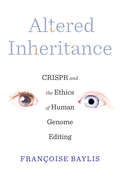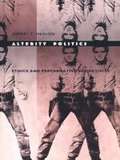- Table View
- List View
All and Nothing: A Digital Apocalypse (Untimely Meditations #5)
by Martin Burckhardt Dirk HoferWhy 1 = presence and 0 = absence and the digital world formula is x = xn: an exploration of meaning in a universe of infinite replication.In the beginning was the Zero, and the Zero was with God, and God was the One.—All and NothingIn 1854, the British mathematician George Boole presented the idea of a universe the elements of which could be understood in terms of the logic of absence and presence: 0 and 1, all and nothing—the foundation of binary code. The Boolean digits 0 and 1 do not designate a quantity. In the Boolean world, x times x always equals x; all and nothing meet in the formula x = xn. As everything becomes digitized, God the clockmaker is replaced by God the programmer. This book–described by its authors as “a theology for the digital world”—explores meaning in a digital age of infinite replication, in a world that has dissolved into information and achieved immortality by turning into a pure sign. All and Nothing compares information that spreads without restraint to a hydra—the mythological monster that grew two heads for every one that was cut off. Information is thousand-headed and thousand-eyed because Hydra's tracks cannot be deleted. It shows that when we sit in front of a screen, we are actually on the other side, looking at the world as an uncanny reminder of the nondigitized. It compares our personal data to our shadows and our souls, envisioning the subconscious laid out on a digital bier like a corpse. The digital world, the authors explain, summons forth fantasies of a chiliastic or apocalyptic nature. The goal of removing the representative from mathematics has now been achieved on a greater scale than Boole could have imagined.
All for Nothing: Hamlet's Negativity (Short Circuits)
by Andrew CutrofelloHamlet as performed by philosophers, with supporting roles played by Kant, Nietzsche, and others.A specter is haunting philosophy—the specter of Hamlet. Why is this? Wherefore? What should we do?Entering from stage left: the philosopher's Hamlet. The philosopher's Hamlet is a conceptual character, played by philosophers rather than actors. He performs not in the theater but within the space of philosophical positions. In All for Nothing, Andrew Cutrofello critically examines the performance history of this unique role. The philosopher's Hamlet personifies negativity. In Shakespeare's play, Hamlet's speech and action are characteristically negative; he is the melancholy Dane. Most would agree that he has nothing to be cheerful about. Philosophers have taken Hamlet to embody specific forms of negativity that first came into view in modernity. What the figure of the Sophist represented for Plato, Hamlet has represented for modern philosophers. Cutrofello analyzes five aspects of Hamlet's negativity: his melancholy, negative faith, nihilism, tarrying (which Cutrofello distinguishes from “delaying”), and nonexistence. Along the way, we meet Hamlet in the texts of Kant, Coleridge, Hegel, Marx, Schopenhauer, Kierkegaard, Nietzsche, Freud, Russell, Wittgenstein, Heidegger, Benjamin, Arendt, Schmitt, Lacan, Deleuze, Foucault, Derrida, Badiou, Žižek, and other philosophers. Whirling across a kingdom of infinite space, the philosopher's Hamlet is nothing if not thought-provoking.
All the Things Left Unsaid: Confessions of Love and Regret
by Michael HardingThe new bestseller from the beloved memoirist and Irish Times columnist Michael Harding.For almost fifty years Michael Harding has been crafting words in a bid to express himself and explore truths about the human condition. But even still he found himself unable to say certain things he really wanted to. Then, while in recovery from surgery, he travelled to a cottage on the Atlantic coast and thought again about life and the people who had profoundly affected him; mentors, lovers and old friends.There at the ocean he wrote letters, with an intimacy not previously risked. Letters that were never posted, but that appear now in this audiobook - a vulnerable and beautifully wrought collection of insights into life, death, friendship and love.(P) 2022 Hachette Ireland
All the Things Left Unsaid: Confessions of Love and Regret
by Michael HardingNUMBER ONE BESTSELLER'A beautiful book of great tenderness, love of life, and wisdom' JOSEPH O'CONNORFor almost fifty years, Michael Harding has been crafting words in a bid to express himself and to explore truths about the human condition. But even still he found himself unable to say certain things he really wanted to. Then, while in recovery from surgery, he travelled to a cottage on the Atlantic coast and thought again about life and the people who had profoundly affected him over the years: mentors, loves and old friends.There at the ocean he wrote letters, with an intimacy not previously risked. Letters that would never be posted but that appear now in All the Things Left Unsaid - a vulnerable and beautifully wrought collection of insights into life, death, friendship and love.PRAISE FOR MICHAEL HARDING'S BOOKSHilarious, and tender ... and always beautifully written' Kevin Barry'Often funny, occasionally disturbing ... Harding has peeled back his soul and held it out on the palm of his hand for all to see' Christine Dwyer Hickey'It's rare for a memoir to demand such intense emotional involvement and rarer still for it to be so fully rewarded' The Sunday Times 'Searingly honest ... Harding's narrative seems to rest on the pulse of Ireland' The Irish Times
All the Wonder that Would Be: Exploring Past Notions of the Future (Science and Fiction)
by Stephen WebbIt has been argued that science fiction (SF) gives a kind of weather forecast - not the telling of a fortune but rather the rough feeling of what the future might be like. The intention in this book is to consider some of these bygone forecasts made by SF and to use this as a prism through which to view current developments in science and technology. In each of the ten main chapters - dealing in turn with antigravity, space travel, aliens, time travel, the nature of reality, invisibility, robots, means of transportation, augmentation of the human body, and, last but not least, mad scientists - common assumptions once made by the SF community about how the future would turn out are compared with our modern understanding of various scientific phenomena and, in some cases, with the industrial scaling of computational and technological breakthroughs. A further intention is to explain how the predictions and expectations of SF were rooted in the scientific orthodoxy of their day, and use this to explore how our scientific understanding of various topics has developed over time, as well as to demonstrate how the ideas popularized in SF subsequently influenced working scientists. Since gaining a BSc in physics from the University of Bristol and a PhD in theoretical physics from the University of Manchester, Stephen Webb has worked in a variety of universities in the UK. He is a regular contributor to the Yearbook of Astronomy series and has published an undergraduate textbook on distance determination in astronomy and cosmology as well as several popular science books.
All the World an Icon
by Tom CheethamAll the World an Icon is the fourth book in an informal "quartet" of works by Tom Cheetham on the spirituality of Henry Corbin, a major twentieth-century scholar of Sufism and colleague of C. G. Jung, whose influence on contemporary religion and the humanities is beginning to become clear. Cheetham's books have helped spark a renewed interest in the work of this important, creative religious thinker.Henry Corbin (1903-1978) was professor of Islamic religion at the Sorbonne in Paris and director of the department of Iranic studies at the Institut Franco-Iranien in Teheran. His wide-ranging work includes the first translations of Heidegger into French, studies in Swedenborg and Boehme, writings on the Grail and angelology, and definitive translations of Persian Islamic and Sufi texts. He introduced such seminal terms as "the imaginal realm" and "theophany" into Western thought, and his use of the Shi'ite idea of ta'wil or "spiritual interpretation" influenced psychologist James Hillman and the literary critic Harold Bloom. His books were read by a broad range of poets including Charles Olson and Robert Duncan, and his impact on American poetry, says Cheetham, has yet to be fully appreciated. His published titles in English include Creative Imagination in the Sufism of Ibn Arabi, Avicenna and the Visionary Recital, and The Man of Light in Iranian Sufism.As the religions of the Book place the divine Word at the center of creation, the importance of hermaneutics, the theory and practice of interpretation, cannot be overstated. In the theology and spirituality of Henry Corbin, the mystical heart of this tradition is to be found in the creative, active imagination; the alchemy of spiritual development is best understood as a story of the soul's search for the Lost Speech. Cheetham eloquently demonstrates Corbin's view that the living interpretation of texts, whether divine or human--or, indeed, of the world itself seen as the Text of Creation--is the primary task of spiritual life.In his first three books on Corbin, Cheetham explores different aspects of Corbin's work, but has saved for this book his final analysis of what Corbin meant by the Arabic term ta'wil--perhaps the most important concept in his entire oeuvre. "Any consideration of how Corbin's ideas were adapted by others has to begin with a clear idea of what Corbin himself intended," writes Cheetham; "his own intellectual and spiritual cosmos is already highly complex and eclectic and a knowledge of his particular philosophical project is crucial for understanding the range and implications of his work." Cheetham lays out the implications of ta'wil as well as the use of language as integral part of any artistic or spiritual practice, with the view that the creative imagination is a fundamentally linguistic phenomenon for the Abrahamic religions, and, as Corbin tells us, prayer is the supreme form of creative imagination.From the Trade Paperback edition.
All-Attainment Teaching in Secondary Mathematics: Philosophy, Practice and Social Justice
by Colin JacksonThis book is about the promotion of all-attainment teaching in the mathematics classroom. The book contains the individual stories of six teachers working in three different schools: an inner London comprehensive with a largely working class intake, a comprehensive on the south coast and a rural comprehensive in Cambridgeshire. Each story describes and explains in brief the background of the teacher and how each came to teach all-attainment groups in mathematics. The research reported in this book is the only close examination and analysis of the practices and methodologies of successful all-attainment educators in the modern age. Three major themes are identified and examined: what sustains the teachers; how they introduce, develop and maintain all-attainment teaching; and how they make all-attainment work in the classroom.From an analysis of these findings, the book presents two interrelated models of the knowledge and understandings the research has generated. The first one is an overarching model of situation and horizon. Used as a means of visualizing and understanding the current situation for teachers, it can aid in encouraging change for the better. The second model offers teachers a way to think of all-attainment teaching as an enabler for all students, most especially for disadvantaged students. Both models have original and explanatory power and offer new ways of conceptualizing how mathematics teaching for social justice might be understood and implemented, offering fresh perspectives and unique insights. As such it will be of help to students at undergraduate, Masters and doctoral level and to education researchers more widely.
Allegorical Form and Theory in Hildegard of Bingen’s Books of Visions (The New Middle Ages)
by Dinah WoutersThis book analyses how the three books of visions by Hildegard of Bingen use the allegorical vision as a form of knowledge. It describes how the visionary’s use of allegory and allegorical exegesis is linked to theories of cognition, interpretation, and prophecy. It argues that the form of the allegorical vision is not just the product of a medieval symbolic mentality, but specific to Hildegard’s position and the major transformations taking place in the prescholastic intellectual milieu, such as the changing use of Scripture or the shift from traditional hermeneutics to cognitive language philosophy. The book shows that Hildegard uses traditional forms of knowledge – prophecy, the vision, monastic theology, allegorical hermeneutics – in startlingly innovative ways by combining them and by revising them for her own time.
Allegories of America: Narratives, Metaphysics, Politics (Contestations)
by Frederick M. DolanAllegories of America offers a bold idea of what, in terms of political theory, it means to be American. Beginning with the question What do we want from a theory of politics? Dolan explores the metaphysics of American-ness and stops along the way to reflect on John Winthrop, the Constitution, 1950s behavioralist social science, James Merrill, and William Burroughs.The pressing problem, in Dolan's view, is how to find a vocabulary for politics in the absence of European metaphysics. American political thinkers, he suggests, might respond by approaching their own theories as allegories. The postmodern dilemma of the loss of traditional absolutes would thus assume the status of a national mythology—America's perennial identity crisis in the absence of a tradition establishing the legitimacy of its founding.After examining the mid-Atlantic sermons of John Winthrop, the spiritual founding father, Dolan reflects on the authority of the Constitution and the Federalist. He then takes on questions of representation in Cold War ideology, focusing on the language of David Easton and other liberal political "behaviorists," as well as on cold War cinema and the coverage of international affairs by American journalists. Additional discussions are inspired by Hannah Arendt's recasting of political theory in a narrative framework. here Dolan considers two starkly contrasting postwar literary figures—William S. Burroughs and James Merrill—both of whom have a troubled relationship to politics but nonetheless register an urgent need to articulate its dangers and opportunities. Alongside Merrill's unraveling of the distinction between the serious and the fictive, Dolan assesses the attempt in Arendt's On Revolution to reclaim fictional devices for political reflection.
Allende and Popular Unity: The Road to Democratic Socialism (Marx and Marxisms)
by Paula Vidal Molina Ximena U. OdekerkenThis book is a fascinating collection of carefully handpicked key texts and speeches from Chile’s 1,000 Days of Revolution, previously unpublished in English. Twenty-three texts embodying the activity of Unidad Popular and Salvador Allende’s government in the early 1970s are structured around five thematic sections, which tell the story of the common challenges for progressive political organizations and social movements today. The themes of participatory democracy and sovereignty, economy and social rights, women and gender equality, indigenous people, and worker-class syndicalism and political organization guide the reader through the multidimensional and global vision of Popular Unity’s socialist project. Ideal for students, scholars, and general readers, this book introduces an extraordinary period in Chile’s history to a new generation of readers interested in the resurgence of democratic socialism around the world.
Alles ist Ökologie
by Mark MaraunDie Idee des Buches ist es zu zeigen, dass Ökologie keine Teildisziplin innerhalb der Naturwissenschaften ist, sondern große Bedeutung für alle Bereiche unseres Lebens hat. Überall wo Organismen interagieren (und das ist ja quasi überall der Fall) gelten die Prinzipien der Ökologie - nur welche sind das überhaupt?
Alleviating World Suffering: The Challenge of Negative Quality of Life (Social Indicators Research Series #67)
by Ronald E. AndersonThis is the first volume on the subject of the alleviation of world suffering. At the same time it is also the first book framing the fields of global socio-economic development, world health, human rights, peace studies, sustainability, and poverty within the challenge of alleviating suffering and improving quality of life. Both international studies and global development have become specialized and fragmented, whereas this work assembles all of these development fragments together in order to determine whether common ground exists to make headway in reducing global suffering. Leading experts in these various fields of development and suffering have been recruited worldwide to give scholarly assessments of the major human problems and how they can be successfully tackled.
Allies of Convenience: A Theory of Bargaining in U.S. Foreign Policy
by Evan N. ResnickSince its founding, the United States has allied with unsavory dictatorships to thwart even more urgent security threats. How well has the United States managed such alliances, and what have been their consequences for its national security? In this book, Evan N. Resnick examines the negotiating tables between the United States and its allies of convenience since World War II and sets forth a novel theory of alliance bargaining.Resnick’s neoclassical realist theory explains why U.S. leaders negotiate less effectively with unfriendly autocratic states than with friendly liberal ones. Since policy makers struggle to mobilize domestic support for controversial alliances, they seek to cast those allies in the most benign possible light. Yet this strategy has the perverse result of weakening leverage in intra-alliance disputes. Resnick tests his theory on America’s Cold War era alliances with China, Pakistan, and Iraq. In all three cases, otherwise hardline presidents bargained anemically on such pivotal issues as China’s sales of ballistic missiles, Pakistan’s development of nuclear weapons, and Iraq’s sponsorship of international terrorism. In contrast, U.S. leaders are more inclined to bargain aggressively with democratic allies who do not provoke domestic opposition, as occurred with the United Kingdom during the Korean War. An innovative work on a crucial and timely international relations topic, Allies of Convenience explains why the United States has mismanaged these “deals with the devil”—with deadly consequences.
Alone Together: Why We Expect More from Technology and Less from Each Other
by Sherry TurkleConsider Facebook—it’s human contact, only easier to engage with and easier to avoid. Developing technology promises closeness. Sometimes it delivers, but much of our modern life leaves us less connected with people and more connected to simulations of them.In Alone Together, MIT technology and society professor Sherry Turkle explores the power of our new tools and toys to dramatically alter our social lives. It’s a nuanced exploration of what we are looking for—and sacrificing—in a world of electronic companions and social networking tools, and an argument that, despite the hand-waving of today’s self-described prophets of the future, it will be the next generation who will chart the path between isolation and connectivity.
Alone With Others: An Existential Approach to Buddhism
by Stephen BatchelorThe author of Buddhism Without Beliefs bridges the gap between Western and Eastern philosophy with this humanist approach to Buddhism. This uniquely contemporary guide to understanding the timeless message of Buddhism, and in particular its relevance in actual human relations, was inspired by Shantideva’s Guide to the Bodhisattva’s Way Of Life, which the author translated into English, the oral instructions of living Buddhist masters, Heidegger’s classic Being and Time, and the writings of the Christian theologians Paul Tillich and John MacQuarrie. “The text is written with unusual clarity of style, making difficult matters readily accessible . . . It fills a serious gap in the dialogue between East and West, and does so in the most sensitive, most intelligent, and most careful way . . . Batchelor’s strategy—to use the Western disciplines in order to make Buddhism accessible to the Westerner—is, I think, highly successful. The book makes a fine introduction.” —David Michael Levin, Department of Philosophy, Northwestern University “Magnificent-inspiring! . . . This excellent book has come to me personally as an illuminating text, despite my close on sixty years’ concern with Buddhism . . . [Batchelor’s] approach is likely to appeal to many categories of readers who have hitherto never considered Buddhism as having great relevance to themselves.” —John Blofeld, from the Foreword
Alpha Male
by Guido Galeano Vega Victor Hugo Susavila CampoAlpha Male, The Leader. This concept is furthermore applied, within the nature or the animal social system. In modern societies, it is also applied to define, certain types of people, which are characterized by their leadership ability.
Als Gleicher unter Verschiedenen?: Diskriminierung evolutionspsychologisch
by Lydia LangeWarum fallen Menschen in alte, zerstörerische Verhaltensmuster zurück? Wegen schlechten Charakters oder einer schlimmen Kindheit? Wenn wir die evolutionär geformte Natur des Menschen berücksichtigen, erkennen wir Möglichkeiten zur Kooperation und zu regelhaft gestalteter Konkurrenz.Soziale Diskriminierung als Begleiterscheinung der kulturellen Evolution kann kooperatives Verhalten untergraben. Konkurrenz als unverzichtbarer Bestandteil für den Prozess der Evolution muss dem gegenüber nicht notwendig in Feindschaft und Aggression münden, sondern kann menschengemachten Regeln folgen. Dieses Buch versucht zu zeigen, Ansatzpunkte in der frühen Phylogenese zu suchen und nicht zu große Hoffnungen auf unsere neuesten kultur-evolutionären Errungenschaften (gesinnungsethische Empfehlungen, Antidiskriminierungsgesetze, Änderung sprachlicher Symbole) zu setzen. Wenn die evolutionär geformte Natur des Menschen berücksichtigt wird, erkennen wir Möglichkeiten zur Kooperation und zu regelhaft gestalteter Konkurrenz. Dies wiederum kann helfen, dass evolutionspsychologische Erkenntnisse zur Vermeidung oder Verminderung sozialer Diskriminierung beitragen können.
Also a History of Philosophy, Volume 1: The Project of a Genealogy of Postmetaphysical Thinking
by Jürgen HabermasThis is the first volume of a ground-breaking new work by Jürgen Habermas on the history of philosophy. In this major new work, Habermas sets out the ideas that inform his systematic account of the history of Western philosophy as a genealogy of postmetaphysical thinking. His account goes far beyond a vindication of the enduring relevance of philosophical reflection founded on communicative reason as a source of orientation in the modern world. He contrasts this conception with prominent diagnoses of the supposed crisis of Enlightenment reason and culture that seeks redemption in the affirmation of traditional religious authority (Schmitt), the timeless validity of Greek metaphysics (Strauss), a numinous conception of nature (Löwith), and an occurrence of being that speaks to us from beyond the mists of pre-Socratic thought (Heidegger). Habermas situates Western philosophy in relation to traditions of thought founded in the major worldviews (Judaism, Buddhism, Confucianism and Taoism) that continue to shape contemporary culture and civilization. At the same time, he lays the groundwork for his analysis in the later volumes of the constitutive role played by the discourse on faith and knowledge in the development of Western philosophy, which is the result of the unique symbiosis that Christianity entered into with Greek thought with the Christianization of the Roman Empire. Far from raising claims to exclusivity, completeness or closure, Habermas’s history of philosophy, published in English in three volumes, opens up new lines of research and reflection that will influence the humanities and social sciences for decades to come.
Also a History of Philosophy, Volume 2: The Occidental Constellation of Faith and Knowledge
by Jürgen HabermasIn this second volume of his groundbreaking new work on the history of philosophy, Jürgen Habermas traces the development of Western thought from the reception of Platonism by early Christian thought, through the revolution in medieval philosophy and theology triggered by the rediscovery of Aristotle’s works, up to the decoupling of philosophical and theological thought in nominalism and the Reformation that ushered in the postmetaphysical thinking of the modern age. In contrast to conventional histories that focus on movements and schools, Habermas takes the dialectic of faith and knowledge as a guiding thread for analysing key developments in the thought of major figures such as Augustine, Aquinas, Scotus, Ockham and Luther that constitute milestones in the genealogy of postmetaphysical thinking. A distinctive feature of Habermas’ approach is the prominence he accords practical philosophy, and in particular legal and political ideas, and the corresponding attention he pays to social, institutional and political history, especially as these bear on the relationship between church and state. As a result, the central preoccupations of Christian thought are shown to be original responses to questions raised by the Christian worldview that exploded the framework of Greek metaphysical thinking and remain crucial for the self-understanding of contemporary philosophy. Far from raising claims to exclusivity, completeness or closure, Habermas’s history of philosophy, published in English in three volumes, opens up new lines of research and reflection that will influence the humanities and social sciences for decades to come.
Also a History of Philosophy, Volume 3: Rational Freedom. Traces of the Discourse on Faith and Knowledge
by Jürgen HabermasIn the final volume of his history of philosophy, Jürgen Habermas offers a series of brilliant interpretations of the thinkers who set the agenda for contemporary philosophy. Beginning with masterful readings of Hume and Kant, he traces the genealogy of their postmetaphysical thinking through the main currents of historicism and German Idealism, and the multifarious reactions to Hegel’s influential system, culminating in nuanced readings of Marx, Kierkegaard and Peirce. Through his analysis of their work, Habermas demonstrates the interpretive fecundity of the central themes of his philosophical enterprise – his pragmatist theory of meaning, his communicative theories of subjectivity and sociality, and his discursive theory of normativity in its moral, juridical and political manifestations. In contrast to the bland compendia of thinkers and positions generally presented in surveys of the history of philosophy, Habermas’s thematically focused interpretations are destined to provoke controversy and stimulate dialogue. With this work one of the indisputably great thinkers of our time presents a powerful vindication of his conception of philosophy as an inherently discursive – and not merely analytical or speculative – enterprise.
Altared Ground: Levinas, History, Violence
by Brian SchroederOne of the most pressing concerns for contemporary society is the issue of violence and the factors that promote it. In Altared Ground: Levinas, History and Violence Brian Schroeder stages an engagement between Emmanuel Levinas, one of the leading figures in 20th century Continental philosophy, and Plato, Hegel, Heidegger, Nietzsche, Merleau-Ponty, Derrida and others in the history of ideas. Not merely an exposition of Levinas' original and complex thinking, Brian Schroeder seeks to re-read the history of Western philosophy and religion by going beyond Levinas' alternatives to traditional theories of the self in order to suggest a notion of subjectivity that is not grounded in violence.
Alter (Alter(n) und Gesellschaft)
by Ludwig Amrhein Gertrud M. Backes Anne Harjes Christopher NajorkIm Zentrum des qualitativen Forschungsprojekts steht die Frage, welche Bilder vom Alter und Altern in der Schule vorherrschen und dort vermittelt werden. Dazu wurden Lehrpläne und Schul- und Lesebücher der Primarstufe und der Sekundarstufe I inhaltsanalytisch untersucht sowie Schüler(innen) der zweiten und neunten Klasse und deren Lehrer(innen) befragt. Das Projekt gibt Hinweise darauf, welche schulischen Alter(n)sbilder und Alter(n)sdiskurse in den verschiedenen Schulformen der alten und neuen Bundesländer vermittelt werden und welche Alter(n)sbilder die Schüler(innen) und Lehrkräfte selbst haben. Auf Grundlage der gewonnenen Ergebnisse wurden die Ansätze zu einer differenzierteren Berücksichtigung von Alter(n)sbildern im Schulunterricht mit Vertreter(inne)n der schulischen Praxis diskutiert und entsprechende Anregungen erarbeitet.
Alterados
by Federico Reyes HerolesFederico Reyes Heroles invita en este ensayo a reflexionar sobre la época en la que vivimos, a través de varias discusiones filosóficas. Del autor de Ante los ojos de Desiré, Noche tibia y El abismo, Federico Reyes Heroles. Una reflexión sobre nuestra vida moderna. En la búsqueda frenética de velocidad, alteración, intensidad, que parece marcar el siglo XXI, Federico Reyes Heroles invita a reflexionar sobre nuestra vida moderna y para ello resume y ordena algunas de las discusiones filosóficas y vitales que están en curso para ayudarnos a entender y dar sentido a nuestra vida. Federico Reyes Heroles, escritor y comentarista político, es profesor de la UNAM, presidente del Consejo Rector de Transparencia Mexicana y presidente del Consejo Directivo de la Fundación Este País. Sus comentarios son ampliamente difundidos por los principales diarios del país. Colabora en Reforma y en programas de radio y televisión.
Altered Inheritance: CRISPR and the Ethics of Human Genome Editing
by Françoise BaylisWith the advent of CRISPR gene-editing technology, designer babies have become a reality. Françoise Baylis insists that scientists alone cannot decide the terms of this new era in human evolution. Members of the public, with diverse interests and perspectives, must have a role in determining our future as a species.
Alterity Politics: Ethics and Performative Subjectivity
by Jeffrey NealonIn conventional identity politics subjective differences are understood negatively, as gaps to be overcome, as lacks of sameness, as evidence of failed or incomplete unity. In Alterity Politics Jeffrey T. Nealon argues instead for a concrete and ethical understanding of community, one that requires response, action, and performance instead of passive resentment and unproductive mourning for a whole that cannot be attained.While discussing the work of others who have refused to thematize difference in terms of the possibility or impossibility of sameness--Levinas, Butler, Derrida, Foucault, Deleuze, Guattari, Zizek, Jameson, Heidegger, Bakhtin--Nealon argues that ethics is constituted as inexorable affirmative response to different identities, not through an inability to understand or totalize the other. Alterity Politics combines this theoretical itinerary with crucial discussions of specific and diverse sites of literary and cultural production--the work of William S. Burroughs, Amiri Baraka, Andy Warhol, Ishmael Reed, Rush Limbaugh, and Vincent Van Gogh--along with analyses of the social formation of subjects as found in identity politics, and in multicultural and whiteness studies. In the process, Nealon takes on a wide variety of issues including white male anger, the ethical questions raised by drug addiction, the nature of literary meaning, and the concept of "becoming-black."In seeking to build an ethical structure around poststructuralist discourse and to revitalize the applied use of theoretical concepts to notions of performative identity, Alterity Politics marks a decisive intervention in literary theory, cultural studies, twentieth-century philosophy, and performance studies.
